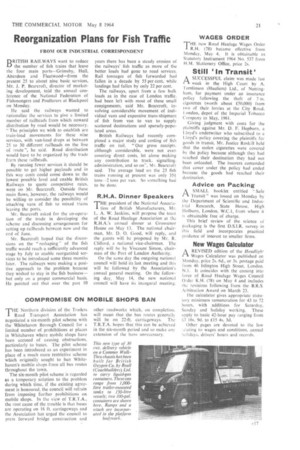Reorganization Plans for Fish Traffic
Page 23

If you've noticed an error in this article please click here to report it so we can fix it.
FROM OUR INDUSTRIAL CORRESPONDENT
BRITISH RAILWAYS want to reduce the number of fish trains that leave the four main ports—Grimsby, Hull, Aberdeen and. Fleetwood—from the present 25 to about nine basic services, Mr: J. P. Bearcroft, director of marketing development, told the annual conference of the National Federation of Fishmongers and Poulterers at Blackpool on Monday.
He said the railways wanted to rationalize the services to give a limited number of railheads from which onward distribution by road would be necessary. " The principles we wish to establish are train-load movements for these nine services, with van-load drops at between 25 to 30 different railheads on the line of route", he said. Road distribution would have to be organized by the trade from these railheads.
By running fewer services it should be possible to get higher payloads and in this way costs could come down to the lowest possible level and enable British Railways to quote competitive rates, went on Mr. Bearcroft. Outside these main flows, however, the railways would be willing to consider the possibility of attaching vans of fish to mixed trains leaving the ports.
Mr. Bearcroft asked for the co-operation of the trade in developing the scheme and discussing arrangements for setting up railheads between now and the end of June.
Mr. Bearcroft hoped that the discussions on the "reshaping" of the fish traffic would reach a sufficiently advanced stage by July to enable reorganized services to be introduced some three months later. The railways were making a positive approach to the problem because they wished to stay in the fish business— but only on a proper commercial basis. He pointed out that over the past 10
years there has been a steady erosion of the railways' fish traffic as more of the better loads had gone to road services. Rail tonnages of fish forwarded had fallen in a decade by 55 per cent, while landings had fallen by only 22 per cent.
The railways, apart from a few bulk loads as in the case of London traffic. had been left with most of these small consignments, said Mr. Bearcroft, involving considerable movement of individual vans and expensive trans-Shipment of fish from van to van to supply scattered destinations and sparsely-populated areas.
British Railways had recently completed a major study and costing of fish traffic on rail. "Our gross receipts. although considerable, were not even covering direct costs, let alone making any contribution to track, signalling. administration, and so on". Mr. Bearcroft said. The average load on the 25 fish trains running at present was only 3.54 tons--2 tons per van. So something had to be done.












































































































